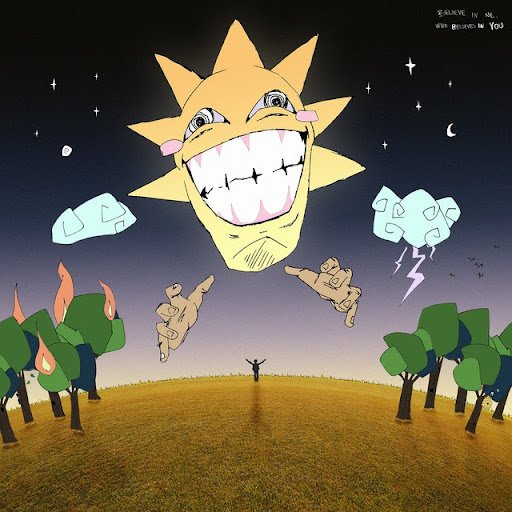Editor’s Picks for the Best Albums of 2021
If there’s one thing that got us through the (continued) hellscape that was 2021, it was music. Afterglow’s Editorial Staff revisits their favorite albums that softened the blow.
Written by Afterglow Editorial Staff
Illustrated by Isabel Alvarez
Content Warning: This article contains mention of sexual assault, abuse, and suicide.
Another year spent navigating a pandemic somehow felt just as apocalyptic as the first. In spite of that — and sometimes in stride with it — artists found a way to make the most of their circumstances. Here’s the 2021 albums that resonated most with Afterglow’s Editorial Staff.
Jubilee — Japanese Breakfast
Image courtesy of Dead Oceans
About a month after the release of her memoir, “Crying in H Mart,” a heartbreaking detailing of her mother’s fight with cancer and their turbulent yet loving relationship, Michelle Zauner and her band Japanese Breakfast released a gleaming album that often sounds like skipping through flowers: Jubilee.
The 10-track project is a self-professed expression of joy, contrasting the band’s two previous records, which delve into Zauner’s grief following her mother’s passing. As is custom for Japanese Breakfast, Jubilee roots itself in immersive soundscapes, but this time, adding twee plucks, vibrant string orchestration, and gleeful horns. Zauner also includes more playful narratives, taking on the persona of a billionaire trying to convince his lover to flee the apocalypse with him to an underground bunker in “Savage Good Boy.” But the singer’s embrace of jubilee doesn’t mean the album lacks emotional nuance. Zauner isn’t afraid to include her hesitations on opener “Paprika,” which features a gleeful parade of noise that denotes the contradictions of her experience sharing her music with others. While she squeals, “Oh, it’s a rush,” throughout, she cuts right through the joyous thesis of the track: “But alone, it feels like dying / All alone I feel so much.” “Tactics” explores the complicated desire to get away from a toxic person informed by her relationship with her father, while unconventional love ballad “Posing For Cars” conveys devotion through a swelling guitar solo that shreds into sonic disfigurement.
Jubilee masterfully fails to paint emotions as black or white, instead filling in the gray tones that give us depth. Joy is filled with contradictions, but as Japanese Breakfast makes clear in its third album, that doesn’t mean we have to ignore it. — Laiken Neumann
BELIEVE IN ME, WHO BELIEVES IN YOU — Aries
Image courtesy of Aries
“Are you tired of being nice?” The menacing sun on Aries’ BELIEVE IN ME, WHO BELIEVES IN YOU’s cover, drawn by the musician himself, seems to ask as it reaches towards unsuspecting listeners. “Don’t you ever just want to go ape shit?”
The 23-year-old’s sophomore effort is for those who’ve been so pressurized they’ve unlocked the ability to act zen under the most stressful of situations. Laid-back, buoyant beats carry Aries’ characteristically cryptic lyrics as he uses 12 songs to discuss the fact that he is, as Franz Kafka once famously put it, “constantly trying to communicate something incommunicable.” While traversing the album, the tone darkens with almost every song, going from proud of the past and hopeful for the future in “BOUNTY HUNTER” and “FOOL’S GOLD,” to combative in “HOW RUDE,” and, finally, reflective in “DESPERADO” and “OUTDATED,” with other tracks in shades that color the in-between emotions. In the final track, “WHEN THE LIGHTS GO OUT,” Aries poses the question that underlies this entire album: “What does the sun even mean to you?”
He pairs upbeat guitar riffs and bouncy percussion with lines that leave listeners the task of deciphering his often heavier meanings, creating a musical uncanny valley that is a unique, albeit at-times baffling, listening experience. He’s found a personal style and has struck an exquisite balance with it, proving that BELIEVE IN ME, WHO BELIEVES IN YOU only scratches the surface of his emerging talent. — Arundhati Ghosh
SINNER GET READY — Lingua Ignota
Image courtesy of Sargent House
To put it simply, SINNER GET READY is Lingua Ignota’s magnum opus. Under this moniker, Kristin Hayter previously released two other albums that boasted her neoclassical-tinged approach to noise rock, but her third record unexpectedly switched to a more stripped-back production style. In my original review of the album, I praised Hayter for her newfound classical sound and religious lyricism, which I wrote suggests “a possible light at the end of the tunnel, a new chapter in which the singer heals from the past and looks to religion for solace.” But we now know that this isn’t entirely true.
Earlier this month, Hayter came forward with allegations that her former long-term boyfriend and frontman of major noise rock band Daughters, Alexis Marshall, had repeatedly sexually abused her throughout their relationship. According to Hayter, he sexually assaulted her multiple times during their two years together, which caused her to attempt suicide in December 2020. In one instance of violent sex, Marshall even caused Hayter a spinal injury so severe that she developed cauda esquina syndrome, which she said “threatened permanent loss of bladder and bowel function” and forced her to create a GoFundMe campaign last year because she could not afford surgery.
With this context in mind, SINNER GET READY becomes even more harrowing. Lyrics like, “I have made my body your vessel” and “The Lord spat and held me by my neck / ‘I would die for you, I would die for you,’ he wept” are not about God, but Marshall, who had godlike power over her life. While knowing the real meaning of this record is devastating, fans can find solace in the notion that Hayter has left this relationship and is reportedly in the process of healing to achieve “a life free from violence.” In a way, SINNER GET READY is a stepping stone in this journey, with therapeutic self-empowerment themes that helped Hayter — and fans alike — unravel her traumatic past toward a better future. — C.S. Harper
Blue Weekend — Wolf Alice
Image courtesy of Dirty Hit
Blue Weekend is a beautiful ode to the emotions of your 20s and the different facets of navigating the intensity of existence at that age. Since its first two albums, Wolf Alice’s music has become a more matured version of its dreamy, floaty indie sounds and bold, anthem-esque rock tracks. The album title, Blue Weekend, sets the tone for the duality of feelings explored in each track, with blue both reflecting clear skies and a tough, melancholy mood. Beginning with “Beach,” which revolves around the anxiety of keeping friendships when you are on a downward spiral, frontwoman Ellie Rowsell expresses the quietness of both contentment and emptiness in a loud way. Though the album touches on a number of subjects, including misogyny and losing yourself to music, one that hits the hardest is the grieving of a doomed relationship. Soft vocals grow into deep, feverish belting, while the drums and guitar strengthen throughout unrequited love ballad “How Can I Make It Okay?,” echoing the intensity of giving so much to someone else and not getting anything in return. Later, in “No Hard Feelings,” the light, poetic feel of the lyrics and vocals build the odd comfort of emotions that once were heavy and difficult. Overall, the album highlights the ambivalence of what it is like to be a young person right now. So much that is taxing, but even in it all, there are blue skies somewhere. — Isabel Alvarez
Pictures of Your Pets — Newgrounds Death Rugby
Image courtesy of Sun Eater Records
Newgrounds Death Rugby marries messy emotions with polished instrumentals in Pictures of Your Pets. The second installment from the South Carolina-based fifth-wave emo band kicks off with slow looping guitar notes and twinkling keys in its opening track, "No. 1," a blunt declaration of Newgrounds' goal to dig deep into listeners' emotions and force them to confront their feelings. The record spins in a darker direction with "Bears" and "Who The F-ck Is Mark?," where cycling guitars and hollow, hammering drums accompany vocalist Danny Jorgensen's embrace of remorse and frustration as they reflect on — and occasionally scream about — failed relationships and overcoming bad decisions. Pictures of Your Pets unearths an assortment of heavy feelings as the album goes on. Angst bubbles beneath the surface in the abstract demands of the video game-inspired track "The World Ends With You" before rising to a fever pitch with Jorgensen's increasingly pained and guttural expressions in "Cary." Towards its conclusion, the record falls back in tempo. The distorted, wailing guitars of the title track, along with Jorgensen's hushed vocals, reflect the catharsis the album was made to evoke, highlighting a steely resignation one can only feel after there's nothing left to feel. In the controlled aggression of album closer "Pipeline Punch," Jorgensen encourages listeners to accept and move past the pain they just acknowledged over the past 30 minutes. Who needs therapy when you have emo music? Newgrounds Death Rugby's sophomore album introduces you to your deepest, most-repressed emotions and makes sure you're well-acquainted by the time it's over. — Kriss Conklin
DONDA — Ye
Image courtesy of Def Jam Roc-A-Fella
Donda generated an immense load of excitement and discussion before it was even released. In the same year that Kanye West legally changed his name to simply “Ye,” the Chicago rapper came out with his 10th studio album. After three separate listening events and numerous rumored release dates, the anticipation that surrounded Donda was overwhelming, but Ye certainly met standards in the 27-track album.
While the project, named after Ye’s late mother Dr. Donda West, received mixed reviews from critics, anyone remotely invested in the rap music scene can agree that it had an astounding impact on 2021. His mother’s death, along with his own battle with bipolar disorder, relationship with his Christian faith, and divorce from Kim Kardashian are just a few of the heavy subjects that Ye delves into on the album with a nearly two-hour runtime. Not all tracks are as reflective and nostalgic as “Moon” or as devotional and religious as “Lord I Need You.” From the Weeknd’s synth-y sound to Pop Smoke’s cocky, money-chasing attitude, features from some of today’s most distinguishable hip-hop artists contribute to the ode-to-rap nature of Donda. The album offered a taste of Ye's incomparable ambition and unconventionality that 2021 needed. — Katie Karp
Sunshine State — Pixey
Image courtesy of Chess Club Records / AWAL / Sony Music
With her second EP of the year, Pixey looks back at a fondly remembered but largely dead sound: Britpop. Even to this day, no one seems to be able to definitively say what Britpop is supposed to sound like — or even what songs fall into the genre — but every track in Sunshine State exudes its own distinct feel, with tunes that seem inspired by both the melodic psychedelia of the ‘60s and the reverberating, upbeat guitar riffs of late-‘80s-to-mid-’90s British bands like the Stone Roses and Blur. The opening track, “Life In Stereo,” establishes the cheerful psychedelia of the EP with drum beats reminiscent of Cornershop’s 1998 hit, “Brimful of Asha,” while the titular track “Sunshine State'' continues the theme with fast-paced, roomy guitar riffs. Even when Sunshine State slows down with the tracks “Shine On” and “Day Dreaming,” it never loses its melodic sensibilities, maintaining a hint of optimism in its airy choruses. All in all, Sunshine State is very much a buoyant blast from the past, brought to life by an artist who, hailing from Liverpool herself, shows an affection for the melodic charm of Britpop that the area gave birth to. In a year that’s been difficult for many, Pixey’s Sunshine State is an EP that helps its listeners get away from it all and feel a little bit more hopeful about things to come, with hints of the optimism that defined British music of the ‘90s. — Wonjune Lee
Home Video — Lucy Dacus
Image courtesy of Matador
Brutally honest songwriting has been in this year, and Lucy Dacus’s third album is a perfect contribution. Over a meticulously crafted pop-rock composition, the singer’s voice is spare and balanced as she reflects on identity and its ties to her roots. Like in albums past, Dacus’ skill on this record comes from her songwriting ability, as she explores childhood in the stifling and enlightening (but not always in the intended way) evangelical community of the early 2000s: an era of megachurches, cheesy Christian rock, and yes, home videos. With a gentle touch, Dacus crafts verses equally unnerving and astute, both re-experiencing the murkiness of adolescence and critiquing it with the wisdom of a woman much older. On the track “Cartwheel,” which sounds like a guitar-plucked lullaby, Dacus reflects on the misplaced grief of childhood ending: “The future isn’t worth its weight in gold / The future is a benevolent black hole.” From platonic friendships to awkward flirtations, Dacus zooms in to micro-examine her childhood and dispense wisdom. Her genius is in the details; these are experiences both intensely personal and universal. After all, who doesn’t have childhood home videos stashed somewhere? — Grace Robertson
Bury Me Beneath This Rotting Earth — Body Void
Image courtesy of Prosthetic Records
A year of recovery is impossible while the knife is still sticking out of your eye. Thus, 2021 hasn’t provided the recuperation and balm necessary to heal 2020’s hot iron branding. Body Void seemed to internalize the events that would precede this album’s release: the anguish, grief, and surrender of 2020 contextualizes its third LP’s thesis. A record about climate apocalypse is a death knell worthy of the 2020s by itself, but the world feels more than ever like it’s — literally and metaphorically — decomposing beneath our feet (“Wound”). It’s not just Mother Nature who lies bruised; those who seek to protect her are piling up on the ground alongside her. Bury Me… burns with hellfire over it. And this record ensures you feel every second of its grim, righteous ire (“Laying Down in a Forest Fire”). Even on anti-racism, this record remains unshaken, and feels less like a protest and more of an omen: Relinquish control or remember what it’s like to crumble into submission (“Pale Man”). This record tears its own innards out to show you how it bleeds: it reflects the deepest dreads of surviving on a decaying planet, all by baring its own poisoned soul. However, it does so with a dominance that, alongside the record’s angst, feels less like a cry for help and more like a warning shot. — Felix Kalvesmaki
333 – Tinashe
Image courtesy of Tinashe Music
The angel numbers 333 simply assure those who seek the cosmos for guidance that despite concerns and fears, they are on the right path. With a foundation of self-production, Tinashe’s second self-release after leaving her former label, RCA, is a pivotal shift into a personal style that is so distinctively hers, it is hard to deny its genius. 333 is unlike any album this year in that it is never singularly pop nor R&B nor soul nor hip-hop, but a mosaic of all of these genres’ best qualities crafted with a fierce brush and a clear third eye. With 333, Tinashe chronicles the qualms of love with an assured rearview. The funky sounds pulsing throughout the album bounce between universes and genres with a grace and mindfulness that can only be done by a true master of the trade. Each song levels up to the next, somehow perfectly despite the album’s diverse soundscape. Seduction slinks through “X” and “Angels,” and declarations of love are made (through perfect pop production) in “Undo (Back to My Heart),” but “The Chase” reveals unwillingness for coercive compromise. The epic that is “Small Reminders” makes use of almost four suites, gliding from groovy recollection to a sensuous interrogation, steering the listener through the tough acts of acceptance and perseverance. Tinashe refuses to fit into the mold of what a pop artist or pop music should be, which is what makes 333 so humanely innovative. — Roberto Soto
Honorable Mentions: Sometimes I Might Be Introvert — Little Simz, Cool Dry Place — Katy Kirby, Collapsed in Sunbeams — Arlo Parks, I Know I’m Funny Haha — Faye Webster, MAN MADE — Green Tea Peng
With 2021 in our rearview mirrors and these albums in our hearts, here’s to hoping 2022 will be less hellish and filled with just as much good music.











